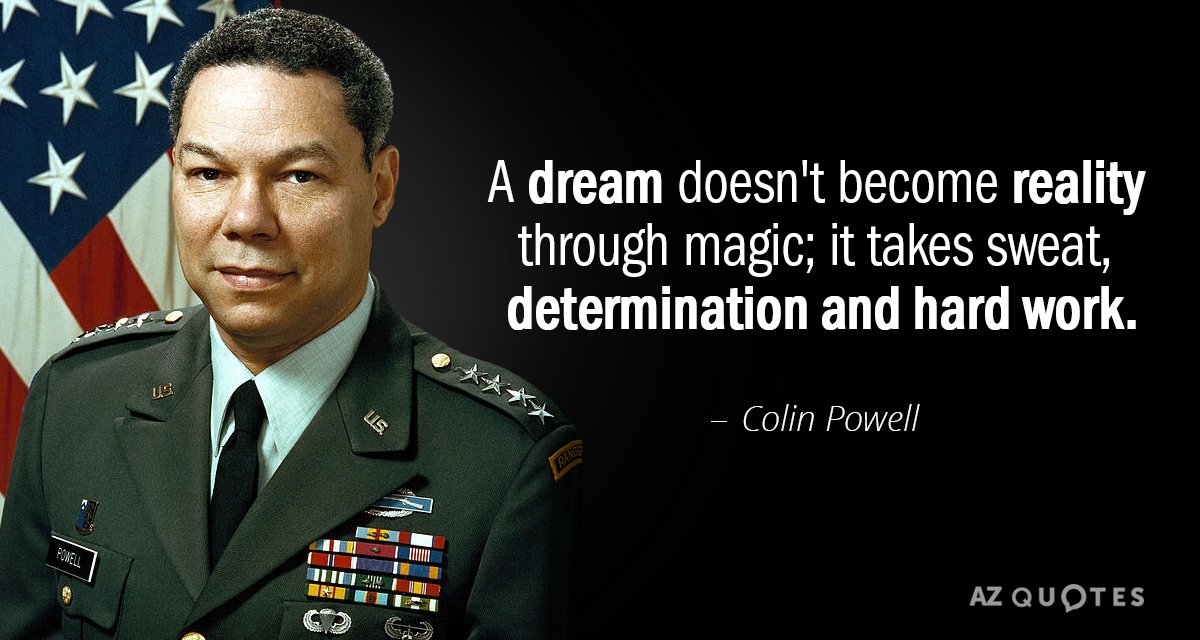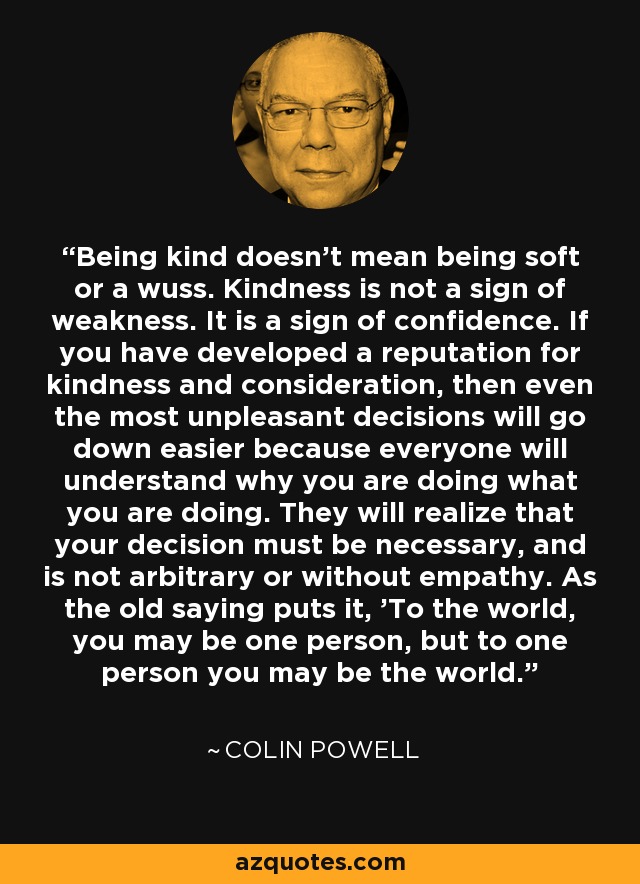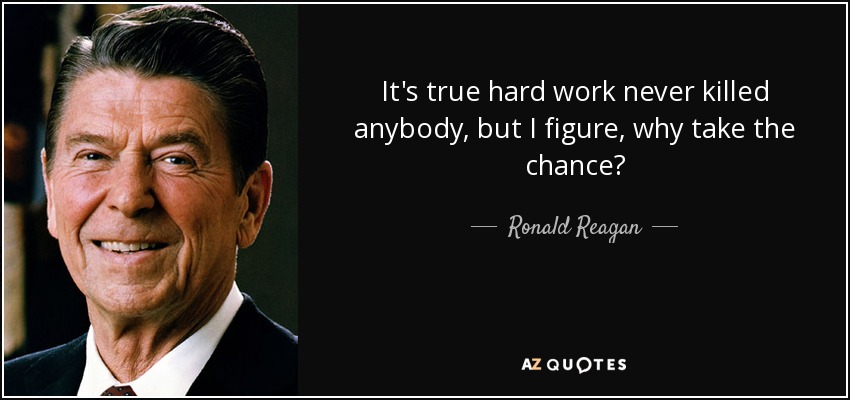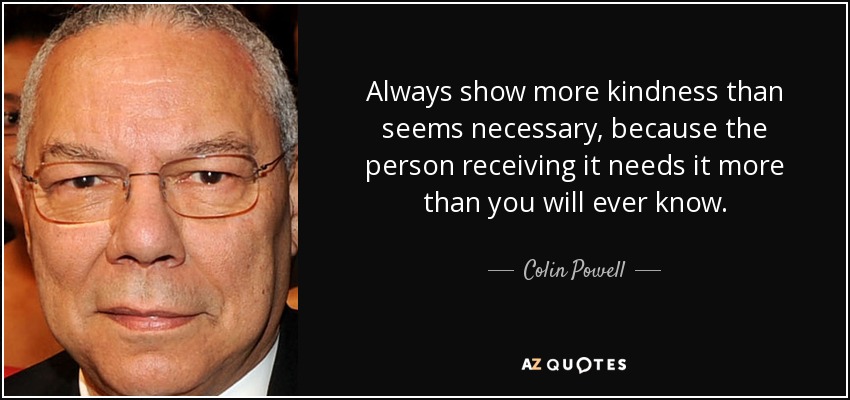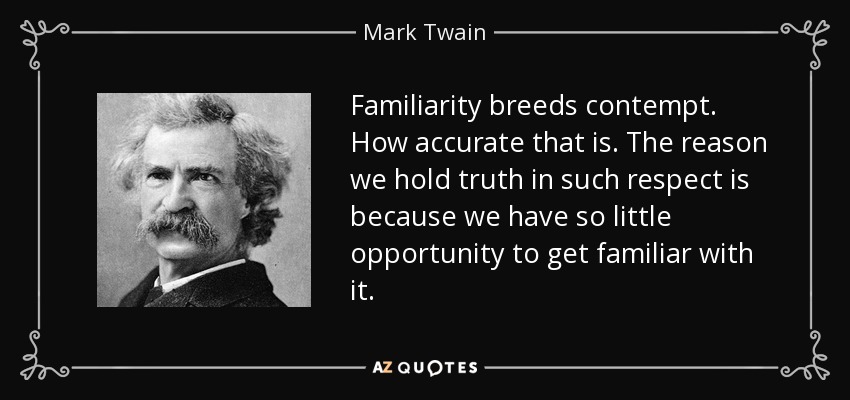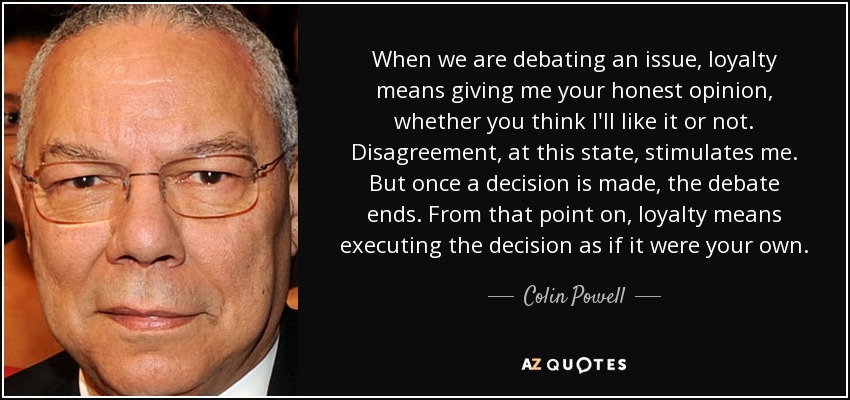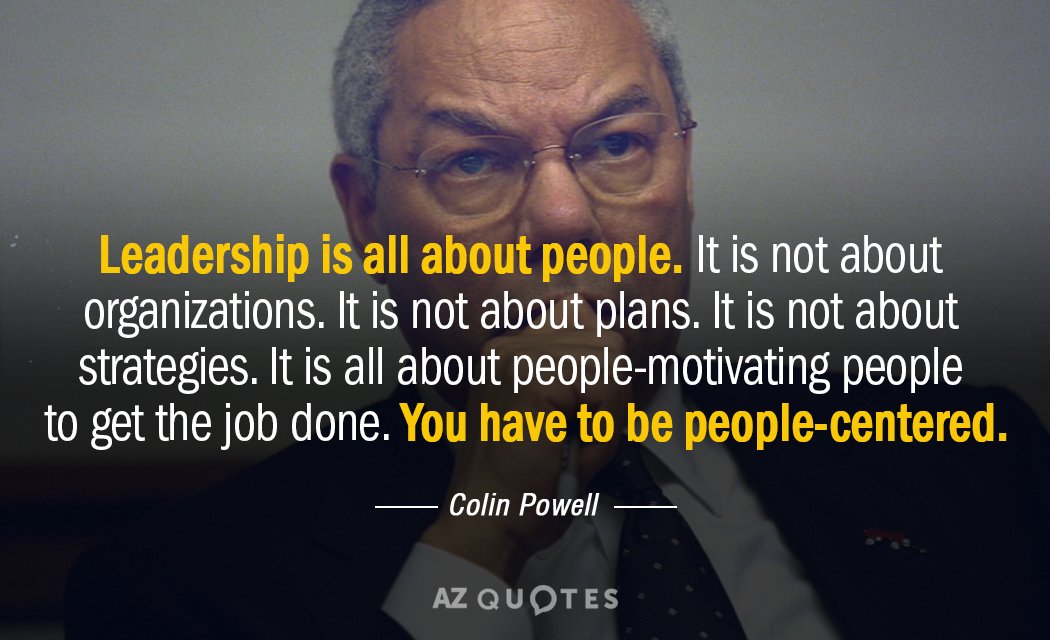Click here to return to Blog Post Intro
Powell’s Thirteen Rules
Powell’s “rules” were first published in the weekend supplement to the newspaper, Parade magazine, in the early 1990s. Check them out:
1. It ain’t as bad as you think. It will look better in the morning. This rule reflects an attitude and not a prediction. Keep your confidence and optimism up, no matter how difficult the situation. At Infantry School, the Army instills the attitude that an infantry officer can do anything. “No challenge is too great for us, no difficulty we cannot overcome.”
2. Get Mad, then get over it. Powell explains, “My experience is that staying mad isn’t useful. I’ve worked hard over the years to make sure that when I get mad, I get over it quickly and never lose control of myself.”
3. Avoid having your ego so close to your position that when your position falls, your ego goes with it. This doesn’t mean you don’t argue with passion and intensity. Powell encouraged all of his subordinate commanders and staff to argue with him. As he put it, “Disagree with me, do it with feeling, try to convince me you are right and I am about to go down the wrong path. You owe that to me; that’s why you are here. But don’t be intimidated when I argue back. A moment will come when I have heard enough and I make my decision. At that very instant, I expect all of you to execute my decision as if it were your idea. Don’t argue with me anymore unless you have new information or I realize I goofed and come back to you. Loyalty is disagreeing strongly, and loyalty is executing faithfully. The decision is not about you or your ego; it is about gathering all the information, analyzing it, and trying to get the right answer. I still love you, so get mad and get over it.”
4. It can be done. It is more about attitude than reality. Have a positive and enthusiastic approach to every task.
5. Be careful what you choose: you may get it. Don’t rush into things.
6. Don’t let adverse facts stand in the way of a good decision. As the old saying goes, “Good judgment comes from experience, and experience comes from bad judgment.” Whenever Powell was faced with a difficult choice, his approach was to make an estimate of the situation—a familiar military process: What’s the situation? What’s the mission? What are the different courses of action? Next, follow your informed instinct, decide, and execute forcefully; throw the mass of your forces and energy behind the choice. Then take a deep breath and hope it works, remembering that “hope is a bad supper, but makes a good breakfast.”
7. You can’t make someone else’s choices. You shouldn’t let someone else make yours. The military teaches soldiers to take full responsibility for “everything your unit does or fails to do, and what you do or fail to do.” Since ultimate responsibility is yours, make sure the choice is yours and you are not responding to the pressure and desire of others. Seek the advice of others. Never forget that your informed instinct is usually the best basis for making a decision.
8. Check Small Things. Success ultimately rests on small things, lots of small things. Leaders have to have a feel for small things—a feel for what is going on in the depths of an organization where small things reside. The more senior you become, the more you are insulated by pomp and staff, and the harder and more necessary it becomes to know what is going on six floors down. The followers, the troops, live in a world of small things. Leaders must find ways, formal and informal, to get visibility into that world.
9. Share Credit. When something goes well, make sure you share the credit down and around the whole organization. Let all employees believe they were the ones who did it. They were. People need recognition and a sense of worth as much as they need food and water. To really reach people, you need to touch them. A kind word, a pat on the back, a “well done,” provided one-on-one and not by mob e-mail is the way you share credit. It is the way you appeal to the dreams, aspirations, anxieties, and fears of your followers. When things go badly, it is your fault, not theirs. You are responsible. Share the credit, take the blame, and quietly find out and fix things that went wrong.
10. Remain Calm. Be Kind. The more serious the situation, usually accompanied by a deadline, the more likely everyone will get excited and bounce around like water on a hot skillet. At those times, try to establish a calm zone but retain a sense of urgency. Calmness protects order, ensures that we consider all the possibilities, restores order when it breaks down and keeps people from shouting over each other. Assess the situation, move fast, be decisive, but remain calm and never let them see you sweat. Kindness connects you with other human beings in a bond of mutual respect. If you care for your followers and show them kindness, they will reciprocate and care for you.
11. Have a vision. Be demanding. Purpose is the destination of a vision. It energizes that vision, gives it force and drive. Leaders must embed their own sense of purpose into the heart and soul of every follower. To achieve his purpose, a successful leader must set demanding standards and make sure they are met. Followers want to be “in a good outfit,” as the Army says.
12. Don’t take counsel of your fears or naysayers. Franklin D. Roosevelt, in his first inaugural address, said, “The only thing we have to fear is fear itself.”
13. Perpetual optimism is a force multiplier. Perpetual optimism, believing in yourself, believing in your purpose, believing you will prevail, and demonstrating passion and confidence is a force multiplier. Powell notes, “We demanded a lot from our soldiers. But we had prepared them, we believed in them, they believed in us, and we had the confidence and optimism that they would succeed.”
Know Yourself, Be Yourself
Always Do Your Best, Someone is Watching
Powell reflects that his parents didn’t pester him or put too much pressure on him. Their attitude was “Do your best—we’ll accept your best, but nothing less.” Always do your best, no matter how difficult your job, or how much you dislike it, your bosses, the work environment, or your fellow workers.
Every job is a learning experience, and we can develop and grow in every one. If you take the pay, earn it. Always do your very best. Even when no one is looking, you always are. Don’t disappoint yourself.
Busy Bastards
Major General Charles M. Gettys said of another general, “He’s one of those ‘busy bastards.’ He always has to be doing things and coming up with new ideas and working absurd hours.” Gettys’s wisdom stayed with Powell, who tried to learn from it. Gettys pointed out to Powell early on (maybe intentionally) a road he was inclined to travel. So, Powell has always done his best to come up with new ideas, and worked hard in all my jobs. But he has tried not to be a “busy bastard.”
In every senior job he’s had, Powell tried to create an environment of professionalism and the very highest standards. He wanted his team to have a life outside the office. He recognized that he is paying them for the quality of their work, not for the hours they work.
Powell explained, “I worked hard all my life and always expected those who worked for me to do likewise. But I tried not to generate makework. I learned early that a complete life includes more than work. We need family, rest, outside interests, and time to pursue them.”
Kindness Works
Don’t just show kindness in passing or to be courteous. Show it in depth, show it with passion, and expect nothing in return. Kindness is not just about being nice; it’s about recognizing another human being who deserves care and respect.
Every person in an organization has value and wants that value to be recognized. Every human being needs appreciation and reinforcement. There are no trivial jobs in any successful organization. But there are all too many trivial leaders who don’t understand this simple and easy-to-apply principle.
Taking care of employees is perhaps the best form of kindness. As the old saying puts it, “To the world, you may be one person, but to one person, you may be the world.”
I’m All Caught Up
Problems come with just being alive, and even more come with responsibility. When they come, you must suck it up and get started again. You are never caught up. Powell lived by the proposition that solving problems is what leaders do.
If your desk is clean and no one is bringing you problems, you should be very worried. It means that people don’t think you can solve them or don’t want to hear about them. Either way, your followers have lost confidence in you, and you are no longer their leader, no matter what your rank or the title on your door.
Walk around and look for a problem; you will find some. Try to instill a problem-solving attitude in your subordinates and staff.
Where on the Battlefield?
In the military, the problem is posed this way: “Where should the commander be on the battlefield?” The answer: “Where he can exercise the greatest influence and be close to the point of decision”—the place where personal presence can make the difference between success and failure.
Because it is important for followers to see and hear from their leader, corporate executives should often visit the factory floor to see what is going on. But then get out of the way so workers, foremen, and line leaders can get on with their jobs.
The right answer to “Where on the battlefield?” is a function of a leader’s experience, self-confidence, confidence in his subordinates, and the needs of his superiors.
Potential, Not Just Performance
Don’t measure your success by your rank or position, but by the contribution you are making. Powell points out, “Many officers I have known should not have been promoted. They were people who performed well at their previous level but whose potential for the level above had been misjudged.”
When we are considering moving people up, their previous record is important, but at least as important is their potential to be successful at the higher level.
Past performance alone does not adequately predict future performance. In both the military and civilian worlds, evaluations of potential are mostly subjective. Here’s what leaders look for:
- Consistently outstanding prior performance in different positions
- Learning and growing intellectually
- Preparing for the next level
- Tested by assignments and challenges generally given to people with more seniority
- Reaching outside his or her comfort zone to acquire skills and knowledge that are not now essential, but are useful at a higher level
- Demonstrated strength of character, moral and physical courage, integrity, and selflessness
- Confident about the next step
- Ego under control and balanced
- Enjoys the respect and confidence of his contemporaries
Leaders are not gods. Their understanding is never totally clear, totally accurate, totally certain. Every leader is human…
Leaders need to watch all their subordinates, work with all of them, encourage the hotshots, but invest in the others. Always be prepared to change your mind. The leader must never forget that he may end up working for one of them.
Take Care of the Troops
Trust Your People
When you first take over a new outfit, start out trusting people there unless you have real evidence not to. If you trust them, they will trust you, and those bonds will strengthen over time. They will work hard to make sure you do well. They will take care of you.
Everything you do as a leader has to focus on building trust in the team. Trust among the leaders, trust among the followers, and trust between the leaders and followers. And it begins with selfless, trusting leaders.
Mutual Respect
Respect for leaders by followers must be earned. Leaders must maintain a certain distance; they can’t get too close. Followers want leaders who are selfless, not selfish. They want leaders who have moral and physical courage, who always do the right thing.
A leader needs to know his followers, and he must be competent; but he is also an individual; he needs to preserve a zone of privacy, a place for himself that followers can’t enter. They need to be kept at a distance.
It might be better said that too much familiarity brings everyone down to the same level. The leader is with the troops, but above them.
Have you heard blowhard leaders who boast, “My outfit is so good, it could function well without me.” Hmmm, then why do they need you? The leader is always above, but never beyond, the followers.
As a leader, you will never receive a better compliment from your followers than, “We’re not going to let you down.” Troops will always get it done and take care of you. Make sure that every hour of the day you are taking care of them.
We’re Mammals
Powell observes, “The best advice I ever received did not come in the form of words or aphorisms. I got it from watching my parents. The most valuable advice I got was from their example, how they lived their lives.”
All followers need to feel they belong to a team, a tribe, a band. Leaders are leaders because they pass on generations of experience they have amassed.
Never Walk Past a Mistake
Make on-the-spot corrections because correcting mistakes:
- Shows attention to detail and reinforces standards within an organization.
- Teaches aspiring leaders to have the moral courage to speak out when standards are not being met.
- Shows the followers that you care about them, the unit, and its mission.
- Sets the example for all of your subordinate leaders.
- Keeps mistakes and screw-ups from moving to another level or, even worse, propagating.
Powell notes that over his many long years of experience, 70% of the time the guys in the field are right and the staff is wrong. Keep that in mind as a leader.
It Takes All Kinds
You seldom will get a perfectly matched set of subordinates.
Now and again it turns out that a subordinate is not in harmony with the leader, and the leader has to relieve him. This is never easy. It can be especially difficult when a subordinate has done nothing specifically wrong that warrants relief.
What should you look for in subordinates? The usual qualities: competence, intelligence, character, moral and physical courage, toughness with empathy, ability to inspire, and loyalty. Beyond that, you want subordinates who will argue with you and execute your decisions with total loyalty, as if the decision were originally their own. Look for people who will fit in with you and with your team.
When choosing people, try to support your strengths and fill in your weaknesses. Always fully empower your deputy to act for you.
People often ask, “What is a leader?” A leader is simply, “Someone unafraid to take charge. Someone people respond to and are willing to follow.”
Leaders must be born with a natural connection and affinity to others, which then must be encouraged and developed by parents and teachers and molded by training, experience, and mentoring. You can learn to be a better leader. And you can also waste your natural talents by ceasing to learn and grow.
Fast Times in the Digital World
Brainware
It’s one thing to install new hardware and software. It’s far more difficult to change people’s brainware. The leader starts to change institutional brainware by setting the example and changing his own.
Major change only works when followers realize your change has made their lives better and improved their productivity and performance. You only know you’ve succeeded in implementing change when your followers believe in the change and will pass their belief on to the next generation of followers. Real change has to outlive the change agents.
Tell Me What You Know
As Secretary of State, Powell developed a set of four rules for his intelligence staffs to ensure everyone saw the process from the same perspective:
- Tell me what you know. This is that you’re reasonably sure that your facts are corroborated.
- Tell me what you don’t know. This is just as important. There is nothing worse than a leader believing he has accurate information when folks who know he doesn’t don’t tell him he doesn’t (like Powell’s infamous speech at the UN in 2003).
- Then tell me what you think. Though verified facts are the golden nuggets of decision-making, unverified information, hunches, and even wild beliefs may sometimes prove to be just as important.
- Always distinguish which from which.
Tell Me Early
Staffs try like the devil to delay as long as possible passing bad news to the boss.
Powell always had a standing rule for his staffs: “Let me know about a problem as soon as you know about it.” Everyone knows the old adage: bad news, unlike wine, doesn’t get better over time.
With early notification, we can all gang up on the problem from our different perspectives and not lose time.
Beware First Reports
Remember “Dewey Defeats Truman”—the banner headline on election night, 1948—which was probably the most famous incorrect first report in American history.
Powell’s experience with hundreds of first reports over the years provided him with a mental checklist for reacting to them:
- Does it make common sense?
- Does it fit with everything else that is going on?
- How much time do I have to figure this out?
- How can I confirm it?
- What are the risks, costs, and opportunities lost?
In his experience, Powell recognized how a deep breath was always a good first reaction to a first report. Try to let a hot potato cool a bit before you pick it up.
Five Audiences
- The reporter asking the question. The reporter is the least important audience. Always remember, you are not talking to the reporter, but through the reporter to the people out there watching and listening.
- The American people who are watching and listening. They expect and deserve honesty.
- Political and military leaders in more than 190 foreign capitals.
- The enemy, who is watching and listening carefully.
- Finally, the troops. They are counting on you. They trust you, and you must never violate that trust.
If you are a senior leader—military, corporate, or financial—who plans to speak in public, you should make a thorough analysis of each audience you will be addressing.
Getting to 150 Percent
Powell’s Advice to His New Aides
How to survive as an Aide—or what not to do
Don’t ever hesitate to ask what to do if uncertain. Don’t ever sign for your leader. Never use money on behalf of your leader. Always gave your personal assistants a petty-cash fund to pay for daily incidentals.
Avoid “The General Wants” syndrome—unless he really does. Provide feedback, but be tactful to those who ask—talks between the leader and you are private and confidential.
Never keep anybody waiting on the phone—call back.
Keep meetings generally uninterrupted because Powell asks a lot of questions. He likes questions and debates. Meetings should be open and probing, and they should be sacred time.
Powell is a people/phone junkie, who likes to remain enormously accessible. The higher he rose, the harder he had to work to remain accessible to people strolling by and not be walled off by staffs and doors.
Powell will develop ways of getting to know what’s happening. The more senior you become, the more staff you have to protect you from yourself and to push their own agenda. They mean well, but they can insulate you from ground truth. You have to get out and walk the floor.
Don’t accept speaking engagements on behalf of your leader. Keep accurate calendars and records. And keep faithful track of calls and whom the leader has seen. Powell always returns calls.
Powell points out that he tends to get moody or preoccupied. He will snap, but that clears the air. Sometimes he lets his temper get the best of him, and blows up. Leave him alone, stay out of the way, and he’ll be back to normal shortly.
Be punctual; don’t waste your leader’s time. Punctuality is a sign of seriousness, discipline, understanding of the value of time, and simple respect and courtesy.
Powell prefers written information to oral. Writing encourages discipline. A well-written analysis of the issue, listing the alternatives and the opposing points of view, distributed and studied in advance, makes for a more productive meeting.
Powell does lots of paperwork—and likes doing it. Make sure correspondence is excellent. No split infinitives.
Never, never permit illegal or stupid actions. No surprises. Powell doesn’t like to be blindsided. Bad news doesn’t get any better with time. If there is a problem brewing, he wants to know of it early—heads-up as soon as possible. If you run on an even keel, and have a good team whom you trust and who trust you, then your folks won’t be afraid to share the worst with you as soon as possible.
Speak precisely. Powell often fudges for a reason. Don’t overinterpret what he says.
Don’t rush into decisions—make them timely and correct. Consider how much time you have before you execute? Take a third of the time to analyze and decide. Leave two-thirds of the time for subordinates to do their analysis and make their plans. Use all the time you have. When you enter the range of 40-70% of all available information, think about making your decision.
Your staff needs to become family as quickly as possible. Create a constructive environment and you’ll have a winning team that will not let you down.
One Team, One Fight
It was a good idea—worth taking to heart—a constant reminder to his command that everyone had to come together as a team to prosecute a fight that everyone agreed had to be won.
Every good leader understands instinctively the need to communicate to followers a common purpose, a purpose that comes down from the leader and is internalized by the entire team.
Compete to Win
We will never throw our soldiers into a competition or battle without preparing them and taking the necessary time to get them ready to win. That’s what leaders do; we prepare our troops. Without competition, we all become dull, unfocused, and flabby—mentally and physically.
Swagger Sticks
Powell doesn’t recall ever telling anyone, “That’s an order.” And he doesn’t recall hearing anyone else say it. Clever, gifted leaders, in sync with their units and culture, can often command with the most delicate touch. Time permitting, it is far better to gain buy-in from followers by explaining what you are trying to achieve and the important role they are about to play in accomplishing the mission. The American soldier is better led than driven.
“They’ll Bitch About the Brand“
Somebody came up with the idea of installing beer machines in the barracks, so troops could drink, if they chose, right at home. Would installing beer machines end the bitching and improve morale? One of my savviest sergeants pointed out, “Lieutenant, putting machines in the barracks won’t end the bitching. They’ll just start to bitch about the brand of beer in the machines, except they will be drunk when they bitch.”
As you examine solutions, make sure you think them through down several levels into secondary effects, and when you arrive at what you believe will be a solution, you have to ask yourself if you have the real solution, or if you have just let wishful thinking set you up for more problems.
Surround yourself with sergeants—that is, people with ground truth experience whose thinking is not contaminated with grand theories.
After Thirty Days, You Own the Sheets
When you assume command, take responsibility and accountability. No whining, no complaining, and no blaming the guy you replaced. Too late, you’ve had your grace period.
Consider using the “Three Envelopes Construct”—the outgoing leader gives the new leader three envelopes:
- Envelope 1: “Blame Me”
- Envelope 2: “Reorganize”
- Envelope 3: “Prepare 3 envelopes”
For normal mammalian human beings in a line position, assume your predecessor did a good job, and if he didn’t, be silent.
Mirror, Mirror on the Wall
(Check out my very first blog post)
Honest, brutal self-examination is especially difficult, but even more vital after a mess, a screw-up, or a failing performance.
One of the most powerful tools the Army used was a technique called the After-Action Review (AAR). The purpose is to autopsy the exercise. Learning and improvement are the sole focus. AAR works because it is a training process, not an evaluation process. What have we done right? What have we done wrong? The sole goal is to improve our performance.
Every organization needs to be introspective, transparent, and honest with itself. High-performing, successful organizations build cultures of introspection and trust and never lose sight of their purpose.
Squirrels
President Reagan believed in delegating responsibility and authority and he trusted those who worked for him to do the right thing.
On many occasions during our time together, Powell brought Reagan presidential decisions that he would think through, question, analyze, and make. He was always available for Oval Office decisions. But he was happier if problems could be solved at a lower level.
In all of his senior positions after serving under Reagan, Powell worked hard to create a Reaganesque level of mutual trust and accountability—trusting that my senior officials would be prepared, do the right thing, know what he wanted done, and be ready to be accountable for their actions.
Every senior leader up to and including the President must organize his team in a way that is consistent with his needs, experience, personality, and style. There is no single right answer to the “how do I organize my staff?” question.
Powell always preferred to keep his staff at the top as small as possible and to work directly with his senior subordinates, whom he vested with authority and influence.
Meetings
Informational or briefing meetings simply inform attendees about a subject of immediate interest. Powell kept a time limit on these meetings to keep them from wandering all over and to prevent spring butts from popping up mostly to hear themselves talking.
Two people together are a meeting. As organizations become larger, even more people need to meet formally and informally. Powell always tried to conduct meetings, no matter how large, with the intimacy and respect of two longtime close friends show each other when reminiscing about their shared past.
The Indispensable Person
Too many people in public life think that if not for them, there would be no light and heat. There are too many people who have long passed their sell-by date and don’t accept that it’s time to leave. Too many leaders have never given a thought to succession or building a leadership team in depth. Leaders need to be ready to replace anyone who is no longer up to the task.
Time to Get Off the Train
No matter what your job, you are there to serve.
Go in with a commitment to selfless service, never selfish service. And cheerfully and with gratitude take your gold watch and plaque and get off the train before somebody throws you off.
Be Gone
Too many executives in the private world hang on long after they have stepped down.
In the Army, when it’s time to go, you go. When you’re an outgoing commander at a change-of-command ceremony, you get a medal, pass the colors to the new commander, give a short speech, and watch the troops march in review in your honor.
Powell always told his successor that he would never call him, but he should feel free to call Powell with questions. If the successor is newly promoted and had worked with Powell, Powell’s job was to train him as a replacement.
Reflections
The Powell Doctrine
Commentators have called the Powell Doctrine’s most essential element “overwhelming force,” but Powell always preferred the term “decisive.” A force that achieves a decisive result does not necessarily have to be overwhelming. Or, to put it another way, overwhelming force may be too much force.
Powell’s own concept of the Powell Doctrine begins with the premise that war is to be avoided. Use all available political, diplomatic, economic, and financial means to try to solve the problem and achieve the political objective the President has established.
When the President decides that only force will accomplish his political objective, then force must be applied in a decisive manner.
Here are the Army manual’s definitions (note the repeated use of decisive):
- Objective: Direct every military operation towards a clearly defined, decisive, and obtainable objective.
- Mass: Concentrate combat power at the decisive place and time.
Luke 14:31 says, “Or what king, going out to encounter another king in war, will not sit down first and deliberate whether he is able with 10,000 to meet him who comes against him with 20,000?” Powell observes that he would rather be the second king with 20,000 than the first with his 10,000…and also have a cleaner objective and a more decisive strategy.
The Pottery Barn Rule
The Media dubbed “The Pottery Barn Rule”: “If you break it, you own it.”
This rule is all about personal responsibility; when you are in charge, you have to take charge. “Taking charge” is one of the first things a young Army recruit learns. Every recruit memorizes a set of rules known as “General Orders.” One of those guard duty General Orders is to “take charge of this post and all government property in view.” The General Order immediately following that one tells you to call someone whenever your instruction does not cover your situation. This establishes a “bias for action,” a readiness to take on any challenge. The Army drills it into officers and sergeants: “Don’t stand there, do something!”
Any leader facing an “if you break it, you own it” decision should preface his thinking with “try not to break it.”
Plans are neither successful nor unsuccessful until they are executed. And the successful execution of a plan is more important than the plan itself.
February 5, 2003: The United Nations
Colin Powell’s presentation became the case against Iraq. Yet seldom is it mentioned that every senior U.S. official would have made the exact same case, or that many of them were in fact making that case on television and in other public appearances. They were all convinced by the same evidence. If they had known there were no WMDs, there would have been no war… And yes, a blot, a failure, will always be attached to Powell and his UN presentation.
It was by no means his first, but it was one of his most momentous failures, the one with the widest-ranging impact. Powell tries to deal with failures and setbacks the same way, following these guidelines:
- Always try to get over failure quickly. Learn from it.
- Study how you contributed to it.
- Once you have analyzed what went wrong and what you did wrong, internalize the lessons and then move on.
- Don’t wallow with your sympathetic friends. Learn and move on.
Parsley Island
Leaders must be problem solvers. If you are not solving problems, you are no longer leading.
The United States is a necessary nation. Despite our own problems, mistakes, and malfunctions, the world continues to look to us to solve or help with problems and crises, big and not so big, whether we have an equity in them or not. We are trusted. We are trusted to fight aggression, to relieve suffering, to serve as an inspiration to freedom-seeking people, to stand alongside our friends, and to welcome the tired, the poor, and the huddled masses of other lands yearning to breathe free. That is who we have been, now are, and always must be.
Speaking is Powell’s Business
Except for the four years he was Secretary of State, public speaking has been Powell’s chief business activity and source of income. Although he had a number of other employment opportunities, Powell chose speaking over sitting on lots of corporate boards, working for a defense contractor, or taking a full-time job in academia or business.
Powell explains, “I love speaking. It’s great fun, and more important, it opens up new experiences and new learning. Every audience is different, and every one requires study. Who are they? What do they do? What’s their purpose? What do they need from me?”
A speaker has more than one responsibility—a responsibility to his audience to give them what they need to hear and if the speaker is representing an organization, he has a responsibility to that organization. Finally, a speaker has a responsibility to himself. He owns whatever comes out of his mouth.
Each speech follows a basic pattern. Powell starts out talking about himself and what’s going on in his life. The stories warm up the audience and show a far more human person than the formal image he had to project when he was Chairman of the Joint Chiefs of Staff or Secretary of State. In his speeches, Powell always includes a segment on leadership. He talks about mission, a sense of purpose, and the necessary connection between leadership and followership. He always ends on a positive note out of his desire to leave audiences upbeat and encouraged.
Best and Worst
Powell probably learned as much from his failures and naysayers as from his supporting rabbis. Failure comes with experience.
As successes come your way, remember that you didn’t do it alone. It is always we.
The Gift of a Good Start
This question always comes up, “When did you graduate from West Point? Well, did you attend the Citadel, the Virginia Military Institute, or Texas A&M?” “No,” I answer, “When I was entering college, a black person couldn’t attend those colleges.”
Powell was commissioned through the City College of New York’s ROTC program—the first ROTC graduate, the first black, and the youngest ever to become Chairman of the Joint Chiefs of Staff.
He is frequently asked why youth programs and education have become a priority in his life. Powell’s answer is simple, “I want every kid to get the chance I had. No, West Point wasn’t in the cards for me, but it showed me the standard I needed to attain. Morris High School and CCNY gave me the means to reach those standards. I’ve learned a simple and obvious truth from my own education experience: We have to give every kid in America the access to public education that I received.”
Powell’s work with America’s Promise focuses on five basic promises we must make and deliver to our children:
- Responsible, caring loving adult in their lives.
- Safe places in which to learn and grow.
- Healthy start and access to continuing health care.
- A good education with marketable skills.
- An opportunity to serve others so they will grow with the virtue of service embedded in their hearts.
Afterward: It’s All About People
Life and leadership can’t be about me. They have to be about us. They have to be about people.
In an office promotion ceremony in the 1970s, Admiral Human G. Rickover, the father of the nuclear Navy, said, “Organizations don’t get things done. Plans and programs don’t get things done. Only people get things done. Organizations, plans, and programs either help or hinder people.” The wisdom of Rickover’s words shaped Colin Powell’s life.
Good ideas must have champions—people willing to believe in them, push for them, fight for them, gain adherents and other champions, and press until they succeed. You need people who will stand up and fight them, put themselves at risk, point out the weaknesses, and drive stakes through their hearts.
It’s all about the people.
Powell concludes, “The people in my life made me what I am.”


